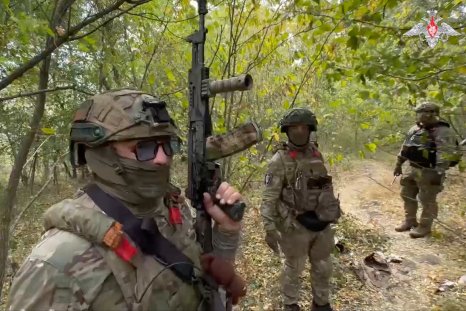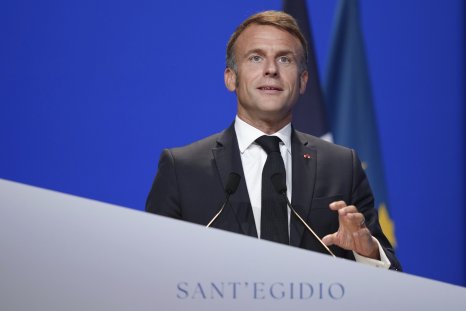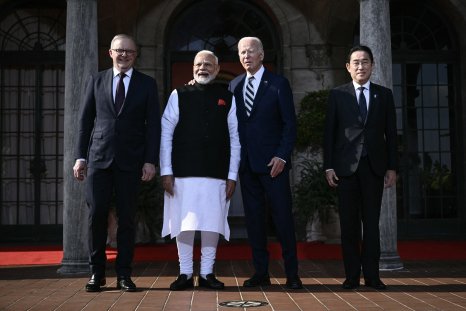Some 45 years after the Iran hostage crisis, when U.S. diplomats were imprisoned in the embassy in Tehran, Iran's rivalry with the United States has only become more dangerous as the Islamic state is poised on the brink of becoming a nuclear power.
Iran's leadership appears well entrenched, but the son of the last Shah told Newsweek a focused Western policy could help topple the Islamist regime, creating an ally.
In an interview from his base in Washington, D.C., Reza Pahlavi sketched out a vision of a democratic Iran, prospering from ties with the West, at peace with Israel, and in harmony with its neighbors. "My only goal in life is that the Iranians can finally go to the election polls and vote their conscience and decide their fate," he said in a video call.
His father, Mohammad Reza Pahlavi, ruled with an iron fist, propped up by Western powers and infamous for his reliance on secret police, until being overthrown in 1979.
Pahlavi, who still uses the title crown prince, has sought to distance himself from that legacy and offers himself – by dint of name recognition and a certain nostalgist zeitgeist – as a transitional democratic leader who can guide the country through a post-theocracy phase.
Pahlavi said the U.S. had projected "weakness" with its efforts to engage the regime, since the Islamic Republic had radicalism in its DNA and cannot be cajoled into better behavior – like giving up its nuclear weapons program.
"You should actually understand why it has to be regime change as a solution because at the end of the day, it's not the gun but the finger on the trigger. It doesn't matter what they sign. You can't trust them for a second," he said.
A response from the Islamic Republic of Iran's Ministry of Foreign Affairs said Newsweek's emailed request for comment was being reviewed
Pahlavi's view rests on three pillars.
First, he believes the regime is loathed by at least 80% of the population, who not only would prefer Western-style freedoms but also look to countries like the United Arab Emirates, a few miles away from their shores across the Persian Gulf, and see the prosperity that has eluded them.
Second, he believes that once the people rebel, under the right circumstances they might be joined by key parts of the regime apparatus, including not only the military but also, critically, some parts of the Islamic Revolutionary Guards Corps – a sort of all-powerful Praetorian guard with a strong presence in the economy which he characterized as corrupt. They would need to believe they would not be hounded by the new regime and even might play a role in the reconstruction.
Scenarios
"The top echelon is obviously benefiting from ... the whole mafia structure," he said. "But the majority of elements within the military, of course the IRGC are not part of these benefitting from it. Some of them have to even have a second job to make ends meet in general. They want out but they are stuck ... So one of the scenarios that will facilitate change which is part of my strategy is to include in the process of natural reconciliation and amnesty the maximum possibility of defections of elements tied to the regime," he said.
Pahlavi said even many Muslim clergy dislike the regime and are "feeling threatened or weakened, as a result of this regime that in the name of Islam have done so much harm." Islam, he said, "has become not people's priority."
He said South Africa's "truth and reconciliation" process – transparent and rather forgiving – would be a model.
Third, he argues that all these local players must receive the right sorts of encouragement from the United States and the West – providing logistical and moral support to opposition movements, sanctioning regime elites without harming ordinary citizens, and tipping the scales in favor of a peaceful revolution.
Pahlavi called for "maximum pressure that includes even more sanctions, not just economic sanctions but targeted sanctions against officials, their bank accounts, freezing their assets, expelling their representatives or diplomats or people affiliated with the regime who are roaming freely in the Western world doing all the money laundering for the regime."
In addition, he said the West should also help fund opposition activity: "The quickest way to paralyze the regime is going to be across-the -board national labor strikes. But such labor strikes have to be funded... We're not talking billions of dollars having to be injected there, but policy has to change." He also argued for engaging the Iranian people directly through social media to assure them of the positive future that awaits them once the regime is gone.
And yet, Pahlavi argued against direct Western military moves: presenting Iran's leadership with an ultimatum to stop nuclear enrichment and hand over enriched materials, halt missile development, and withdraw support for proxy militias – or else face blockades of its ports and destruction of oil installations and nuclear sites, for starters.
Pahlavi said it would be better to at least try to encourage a change that comes from within Iran itself.
Iran has already seen repeated waves of protests in recent decades, from the 2009 Green Movement to the 2022 movement after 22-year old Mahsa Amini died in custody. What's missing, in his view, was decisive Western support that would exploit the weakness within the regime's apparatus.
Pahlavi drew a parallel with the fall of communism. In the late 1980s, it seemed impossible that the deeply entrenched communist regimes would ever fall. Yet, when the people rose up, regimes that seemed immovable crumbled with surprising speed — with Nicolae Ceausescu's Romania as a prime example.
When regime change comes, he said, the new Iran would be at peace with Israel – especially since he expected without the threat from Iran's myriad proxies in the region, including Palestinian factions like Hamas that reject long term peace, Israel would be more accommodating to the Palestinians. "Israel is the only exception in the Middle East as a democratic country. in comparison with everything else that we have, it could be an extremely important strategic partner to us," he said.
Pahlavi appeared convinced that the Iranian people — educated, connected to the world via technology, and hungry for freedom — are capable of establishing a functioning democracy along any model, from a republic to a constitutional monarchy.
"Experts in their field right now are contemplating focusing on propositions, ideas and remedies. We have economists studying about what could be done – the first hundred days had we manage the country," he said. "There's a whole host of people doing their part in these complex scenario and I am trying to assist as much as I can, and making sure that every component is in place."
"It could happen relatively fast," Pahlavi said. "The nation is ready. But they cannot be kept out there hanging without any other elements happening."
Disclaimer: The copyright of this article belongs to the original author. Reposting this article is solely for the purpose of information dissemination and does not constitute any investment advice. If there is any infringement, please contact us immediately. We will make corrections or deletions as necessary. Thank you.



